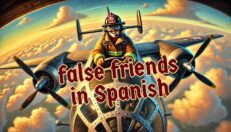Speaking Like A Spaniard: 25 Spanish Slang Terms You Should Know

Get our free email course, Shortcut to Conversational.
Have conversations faster, understand people when they speak fast, and other tested tips to learn faster.
More infoIf you ever decide to visit one of the many Spanish speaking countries, something you’ll quickly notice is that locals love to use Spanish Slang i.e. words that are probably exclusively used in that country, or even possibly, specific to that region you’re in.
Of course, knowing some country specific slang is a fantastic way to break the ice and befriend a local native speaker.
In case you missed it, we already covered a bunch of country-specific slang terms, including:
Today, we are going list the 25 most common Spanish slang terms you’ll hear from a Spaniard, whether it’s walking the streets of Madrid, or from a Spanish friend.
1) Guay
Guay is Spanish slang that normally refers to something or someone cool, and can even go as far as amazing. In general, you can use it for anything positive.
- Que guay esa motocicleta – That motorcycle is really neat
- Cuando lo conozcas te va a parecer super guay – When you get to know him you gonna think he’s great
2) Vale
A commonly used agreement word, similar to “ok” or “alright”.
- Vale, más tarde voy y te ayudo – Sure, I’ll come by later and help you
- Espérame acá, ¿Vale? – Wait for me here, alright?
3) Venga
This one can also work a filler word too, with a translation that could be considered as a more enthusiastic “alright!”, or indeed, a frustrated “come on”
- Venga, juega un rato con tus primos – Come on, play with your cousins for a while
- ¡Venga! Entonces vamos saliendo – Alright! Then let’s head out
4) Hombre
In English, some native speakers use this one in a similar way. The literal translation is “man”, but in Spanish slang, it’s used as a term of endearment to the point where its meaning is used more as an interjection, rather than its literal one.
- ¡Hombre! Cuanto tiempo sin verte – Man! Really long time no see
5) No pasa nada
This translates as “nothing is happening” but is used to say there’s really no consequence, or problem – ie. a reassuring expression. Similar to “no worries” in English.
- Claro hombre, no pasa nada. Es más, te invito una copa – Sure man, it’s nothing. I’ll even invite you a drink
6) Puente
A “bridge” is what happens when a national holiday falls on a Thursday/Friday, and you have an extra long weekend.
- Mejor aprovechamos el puente para pasar unos días en la playa, ¿Te parece? – What about if we grab the long weekend to spend a few days at the beach, how does that sound to you?
7) Tío or Tía
This one can be a bit confusing at first since the words directly translate to “uncle” and “aunt”. However, in Spanish slang, they are used to replace “man” and “woman” in everyday conversation. They aren’t tied to a possessive word (my, yours, his etc), which means you’ll know if someone is actually talking about their family or not.
- Vino a saludarte una tia muy guapa – A really pretty girl came to say hello to you
- Voy a estar con esos tíos de allá, ¿Los ves? – I’m going to hang around with those guys over there, do you see them?
8) Guiri
If you’re familiar with the Mexican slang term “gringo”, then this one isn’t too dissimilar. This word is Spanish slang for North Americans and other Europeans. While it’s not necessarily offensive, it might come across as poor taste to some people.
- Eh, José, tú tienes varios amigos guiris, ¿Cierto? – Hey, José, you have a few foreign friends, right?
9) Colega
You could say that this is close to a “buddy”, and often replaces the word “amigo” to refer to acquaintances, or people you don’t quite know. This one is exclusive to slang from Spain, since it literally means co-worker in any other Spanish speaking countries.
- Colega, has dejado el auto mal estacionado – Hey, pal, you parked a bit poorly there
- Tengo un colega que trabaja allí que podría ayudarte – I have a friend that works there and could help you
10) Chaval
Also found as chavala (feminine version), this is Spanish slang for kids or young people in general.
- Échale un ojo a los chavales – Keep an eye on the kids
- Estaba ayudando a una chavala que estaba perdida – I was helping a girl that got lost

Unsure what to learn next?
Download the exact curriculum that thousands of BaseLang students have used to become fluent in Spanish.
Download Guide Now!
11) Los Viejos
“The old people” is not the most respectful term for your parents, but it’s meant in an affectionate way. Some people might be okay with this, but others may not (if you ever called your dad, “my old man”, then you know what I’m talking about).
- Esta semana estaba pensando en visitar a los viejos, ¿me quieres acompañar? – I was thinking about visiting my parents this week, do you want to come along?
12) Majo
A word used for friendly, affectionate, or pleasant people to be around. Although, it can also refer to someone who is really attractive.
- Tu amigo es super majo – Your friend is really nice
- No esperábamos que llegaras con una tía tan maja – We didn’t expect you to come with such an attractive girl
13) Estar como una cabra
“To behave like a goat” is a fitting term for someone who behaves in a really strange way. Similar to someone “being nuts” in English.
- No le prestes mucha atención a mi vecina, está como una cabra – Don’t mind my neighbor that much, she’s got a few screws loose
14) Estar en Pelotas
“Being in the balls” isn’t as vulgar as it sounds. It actually means being completely naked – random, I know.
- Que suerte que llegas un poco tarde, 5 minutos menos y me agarrabas en pelotas. – Man, I’m lucky that you got a bit late, 5 minutes earlier you would’ve found me naked.
15) Molar / Mola
This Spanish slang can be used in several ways – as a verb, it can mean to be cool or to want or like something.
- ¡Cómo mola! ¿no? (Cool, isn’t it?)
- ¿No te mola lo que le hicieron a la casa? Se ve mucho mejor ahora. – Don’t you like what they did to the house? It looks way better now
- Oye, molas mucho cuando juegas así – Hey, you look really cool when you play like that
16) Chulo
In most Spanish speaking countries, “chulo” would be translated as “pimp”. However, this Spanish slang term is used to describe or address someone who is attractive, or something that is cute, lovely or neat.
- Qué chulo tu auto nuevo, ¿Cuanto te ha costado? – Man, your new car looks really nice, how much did it cost you?
17) Ostia
A common way to denote surprise in Spanish slang, and usually accompanied by offensive imagery.
- ¡Ostia tío! Mira lo que pasó la semana pasada – Holy mother of god, look at what happened last week
18) Cutre
A commonly used word for things that aren’t pleasant to look at, or made of really poor quality, or perhaps not even finished.
- El hotel que eligieron se veía un poco cutre, pero era más barato – The hotel they chose looked really bad, but it was cheaper
19) Friki
Adapted from the English word “freaky”, it has an almost identical meaning in Spanish slang since it’s used to describe weird, extravagant stuff, or things you’re not used to seeing.
In recent years, it has taken on a second meaning, referring to a “geeky” person who is perhaps computer savvy, and a video game aficionado.
- Que friki esa situación, mejor no me involucro – That’s a really weird situation, I’d rather not get involved
- Le puedes llevar el computador al friki de la clase para que lo repare – You could take your computer to the class geek for him to repair it
20) Empanado
We all know someone who is perpetually “empanao” – ie. slow and absent minded, barely paying attention to anything they should.
- A ver, mira para adelante que andas todo empanado – Hey, look in front of you, you’re going around all absent minded
21) Cabrearse
To get upset, or more vulgarly put, to be pissed about something – hopefully you don’t need to use this one.
- Se cabreó cuando le contamos lo que pasó. – He got really upset when we told him what happened.
22) Bocachancla
A not so kind term for people who talk way more than they should, and usually about delicate subjects.
- Eh, no seas tan bocachancla, cállate mejor – Dude, don’t be such a big mouth, shut it, please
23) Flipar
There are two cases where Flipar is used 1) when you are absolutely blown away by new information that leaves you astonished 2) to describe an effect caused by drugs.
- La audiencia del concierto empezó a flipar con el primer riff de la guitarra – Concert attendees went completely insane with the first guitar riff
- Creo que estaba actuando raro por estar flipando de algún estupefaciente – I think he was acting weird due to being under the influence of some drug
24) Ligar
An almost literal translation of “to flirt”, or getting someone’s attention in order to woo them.
- Te vi ligando con aquel chaval – I saw you flirting with that boy
25) Joder
And last but not least! Something that you have probably heard before in a TV show or movie based in Spain. “Joder” is probably the most commonly used Spanish slang term, since its most accurate translation would be “fuck”. Like the equivalent in English, it can be used to refer to sexual relations, to bother or annoy, to ruin or spoil, and as an interjection to let your anger out, amazement or frustration.
Pretty handy if you ask me.
- ¡Joder! He olvidado mis llaves en la casa – God dammit! I forgot my keys at home
- ¡Joder tío! Nos hemos quedado dormidos, vamos a llegar tarde. – Fuck dude! We fell asleep, we’re going to be late
- ¡Jodiste todo lo que había hecho! – You completely destroyed everything I had done

Unsure what to learn next?
Download the exact curriculum that thousands of BaseLang students have used to become fluent in Spanish.
Download Guide Now!



